Every few weeks a story surfaces concerning violence and depravity attributed to video games. A grown man beats his daughter to death for turning off his console before he could save his progress in Fallout 3. A man guns down seventy people and is later found to be a fan of Call of Duty. A lonely high school kid stands up after a marathon session of Ragnarok Online and a blood clot that had been biding time in his leg rises, converges with his brain, and kills him without delay.
The intent behind these carefully crafted news stories is to demonize video games – a new form of entertainment that many people refuse to accept out of ignorance and snobbery. Such stories are easy to disarm: if video games didn’t exist, something else would be in their place. If it wasn’t a disrupted game of Fallout 3, it would be a disrupted television show; if it wasn’t Call of Duty, it would be military novels or memorabilia; if it wasn’t Ragnarok Online, it would be the Internet itself. Video games are not the core of the problem, only facilitators no more potent than guns, religion, other technology, and ideologies.
What rarely surfaces are stories of hope, redemption, and salvation attributed to video games. A foolish man might claim that this is so because there are no such stories. A wiser man knows that they exist in droves. Here are five such stories focusing on the genre we love, collected for your enlightenment and for the argument that video games are important and benevolent creations. RPGs are therapy.
Anger
by Robert Steinman
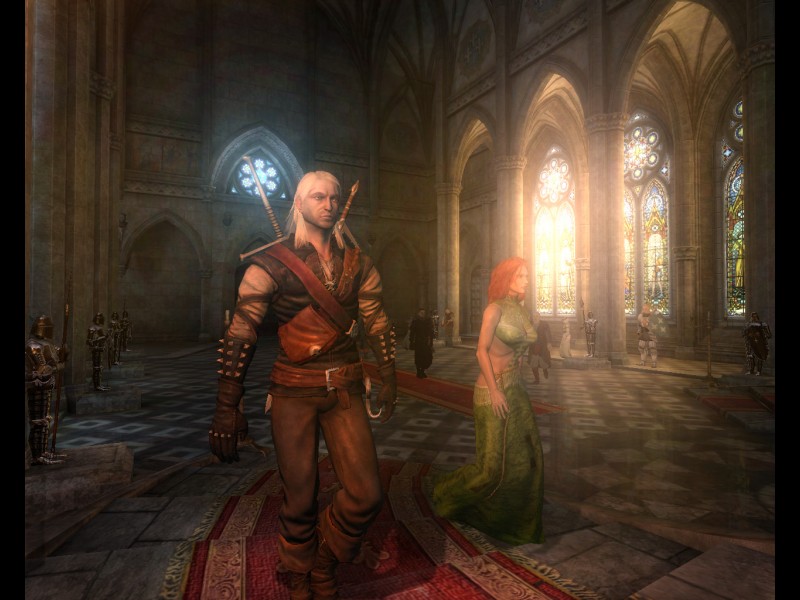
I feel bad for my neighbors. The noises coming from my apartment during a long gaming session must resemble Regan in The Exorcist. I yell and curse whenever something doesn’t go my way. I must appear childish and buffoonish when making my case for what just happened on screen. But the interesting thing is how much these actions contrast with my general demeanor. I’m usually happy-go-lucky, walking around with a smile on my face and a spring in my step. I’m pragmatic even when frustrated, which is more than I can say when I throw a temper tantrum like a 2-year-old playing a video game.
“I’ve had friends look at me awkwardly when I yell at a game and then turn it off and return to the couch with a giant smile on my face.”Everyone deals with anger in a different way. Cliché, I know, but it’s very true. I usually bottle up my negative thoughts and emotions because I don’t want to hurt the people around me. The problem is that a man can only take so much, and eventually the negativity bubbles over like a pot left on the stove too long. I have to release these feelings somewhere, not just for my loved ones’ sake but also for my own sanity. When I yell at a video game over something relatively minor (perhaps a missed sword slice in The Witcher, or a critical hit in Persona sending my main character to an early grave) it’s more about getting out my frustrations built up over the course of the day than anything else. I’ve had friends look at me awkwardly when I yell at a game and then turn it off and return to the couch with a giant smile on my face. I’ve tried to play games without getting angry, but I’ve seen the pot boil over in my regular life as a result. I have to be emotional when I play video games because it helps me deal with the trials of everyday life. I’d rather yell at Link or Solid Snake than my loved ones, as fictional characters can never be hurt like those with beating hearts and real feelings. You may call my ravings childish, but I call them therapeutic.
Bad Attitudes
by Bob Richardson
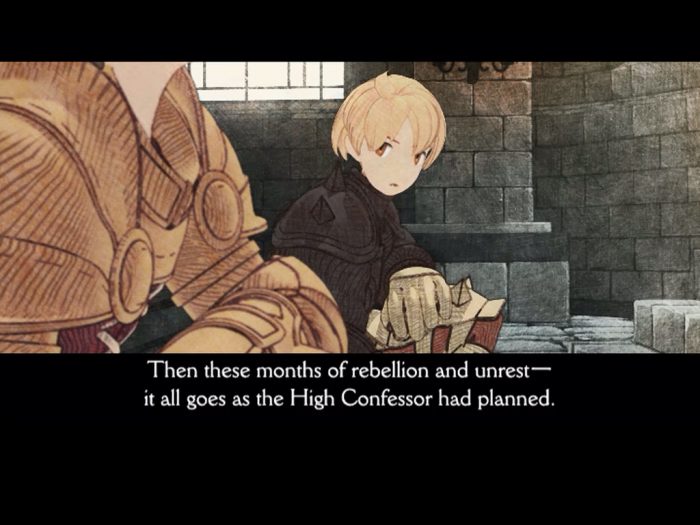
My man-toad 10th grade English teacher taught me little, but one thing I’ve retained from that class is that whenever I read a book, I have to reflect on what I’ve gained from the experience. Admittedly, I’m not much of a reader, but when it comes to RPGs, I always ask myself this question. When I crave a good story, movies and books are fine, but nothing has ever compared to an RPG. This movie-book-orchestra amalgamation with a heavy dose of interaction has titillated my need for philosophy and intellectual insight since I started learning how to read. I owe much to RPGs, but what I’ve gained the most is a healthy, positive outlook on life, when in the midst of my adolescence I was excessively critical and bitter about reality.
“That mucilaginous negativity had morphed into a cold lump of apathy and fatalism.”Although my viscous pessimism didn’t start until middle school, my life throughout elementary school likely served as an impetus. My family had always struggled financially, and this reflected in the clothes I wore to my suburban school. For those unaware of elementary school culture in suburban areas, not wearing brand-name clothing is akin to pulling yourself up the flagpole by your underwear. Despite this, I embodied a great deal of resilience, and studied hard throughout school. Much of my spare time was spent playing with friends and holing up in my room with RPGs – the original Dragon Warriors, Final Fantasy IV and VI, and Chrono Trigger. I had no idea at the time, but these games would follow me for the rest of my life, leaving firm impressions on many aspects of the person I’d become.
When I made it to middle school and started to form some solid friendships, I had a sort of intellectual awakening that was probably developmentally appropriate. I hungered for philosophical ideas, and after my family got the Internet, I scoured the wires for moral sustenance. A rough school and home life left me wanting for answers as to why I had experienced trials that no one else I knew had to. What I found in chat rooms were other youths like myself who had the same philosophical yearning. We threw ideas around, and, lo and behold, discovered that we played similar games.
An immature understanding of philosophers like Nietzsche and a hard upbringing birthed my cold, unfeeling view on – well – everything. What’s more, the old escapist entertainment I used to rely on provided a soap box for the ideas I began to foster. At this point, Kefka seemed to have a clear view of the big picture. I twisted his lunacy into logic by grasping onto key quotes, like how people continue to rebuild that which is destroyed, the impermanence of life, and, most of all, the ultimate meaninglessness of it all. I sat there building on Kefka’s lines: we live, do nothing, and rot in the ground. And what for? What will we have to show for it? That mucilaginous negativity had morphed into a cold lump of apathy and fatalism. Some people have a good run, while others suffer. I knew I didn’t have the worst of it, but I couldn’t help feeling cheated.
When I got a PlayStation and Final Fantasy VII, I was in the prime of my hate. I never smiled, I often felt nothing when I heard bad news about people getting hurt or dying, and I unabashedly communicated brutal honesty to anyone outside my group of friends. Sephiroth was someone to admire. He understood how selfish people were, and how they used and mistreated those who were otherwise helpless. At the time, I didn’t fully comprehend FFVII‘s plot, but I knew that Shinra symbolized everything I hated about people; human nature was vile, and needed to be eradicated. I saw proof of this in everyday life. Self-serving people surrounded me, and billions of others had contaminated the world. Nevermind the irony in playing as the protagonists trying to save the planet from being cleansed, staving off Meteor in the name of Good.
“I owe much to RPGs, but what I’ve gained the most is a healthy, positive outlook on life…”Final Fantasy Tactics only served to further engross me in my disgust of human nature. Of course, I enjoyed Delita’s character: manipulating those to his will after he realized just how repulsive humanity can be. However, Wiegraf was my favorite character because he was a small character who got swallowed up in a torrent of greed that he could never hope to combat. This greed led him to desperation and a desire for power in order to thwart those who had wronged him and those he cared about. He wasn’t the most complex character, but that was why I liked him – I felt like I could relate to his powerlessness.
Then, one day, with no stimulus whatsoever, I had the greatest feeling of enlightenment that I have ever experienced. A wealth of knowledge either awoke in me or rained down from the Heavens all St. Augustine style. I realized that the antagonists I had admired – Kefka, Sephiroth, and Delita – were all miserable. These characters reflected what I had come to know – or what I thought I knew – about people, yet they were just as miserable as I was. The protagonists fought, and even though their travels were hard, they smiled and fought for the well-being of others; they embodied a sort of altruism. Simply put, good vs. evil was oftentimes happy vs. anger. Which is the more enjoyable emotion? Which do we enjoy feeling?
At this instant, I decided that the meaning of life is to be happy. We strive for nothing else other than to be happy, or, at the very least, to choose the least painful option if all choices are terrible. I had set a course for misery and disdain toward all things. Why? Probably because anger is easy and pleasing on a baser level. However, any rational, intelligent person would venture toward happiness. This I learned in brooding protagonists who changed over the course of a game – the kinds of iconic JRPG heroes that annoy so many grown up Westerners. Cecil had this sort of awakening, Squall stopped pushing others away, and Cloud formed his own identity – these lessons came sweeping in all at once.
I went to school the next day with eyes wide and teeth a-struttin’. My friends immediately noticed the difference, and I dodged all of the questions – pretty embarrassing to admit some video game characters got me out of my years of despondency. A week later, I had a rush of new friends and popularity as I felt a more charismatic person pop out of me where an intentionally mean-spirited one once resided. A girl friend of mine told me rather unashamedly: “Bob, I used to be kinda scared of you, but you’re actually a pretty cool guy.” Another: “Bob, you should smile more! You have a great smile.” I am and I do. Thanks, pixels and polygons.
Stop pressing attack.
Catharsis
by Stephen Meyerink
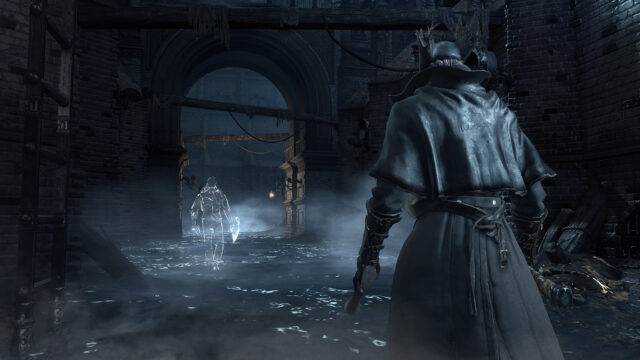
Something about my personality has always demanded that I do two things when playing an RPG: play on the hardest difficulty available, and (with rare exceptions) only play through once, completing everything. I don’t play on the most challenging level for bragging rights or to show off that I’m awesome – I do it because the most integral part of an RPG is the struggle. Be it good versus evil, man versus the world, man versus man, or whatever permutation of conflict the game can cook up, I have to feel like I’m fighting for a goal – and I have to feel like I’m fighting tooth and nail for every inch of ground gained. I’ve quit games that felt too easy or didn’t challenge me enough because the whole time I sat there saying, “Who cares? Anyone could be winning this fight.”
“Call it a hero complex, if you will – I want to save the day, and I want to overcome huge odds to do so.”I relish challenge, and even in the most infuriating moments of a game, the promise of overcoming that seemingly insurmountable challenge is enough to help me stay cool. In fact, it’s a catharsis – becoming invested in the characters; in the adventure; in the grand struggle between forces is what drives me, but without the challenge, I just can’t do it. Call it a hero complex, if you will – I want to save the day, and I want to overcome huge odds to do so. I want to be Ramza, Fei, the Bhaalspawn, the human Spectre, the Embryon, and the Harmonixer who’s lost the one he loves, so that I can enjoy that delicious moment of victory when I at last turn things around.
This complex of mine ties in with a game’s story, which is why I normally don’t replay games. When the challenge of the gameplay and the climax of the narrative come together, that grand catharsis is the greatest moment of “this is why I play these games” I can have. When Taelus Shepard landed on the Collector ship and started charging all over the battlefield, one-two-shotting the Harbinger in seconds with the krogan shotgun, I felt a sense of satisfaction and justice. My power didn’t come easily, and it only did so after a lengthy journey, but avenging my fallen comrades and stomping all over the self-satisfied fiends responsible made it worth every second. Those moments of story-fueled justice could never be recaptured in a subsequent playthrough – exactly why I don’t replay games.
Depression and OCD
by Kyle E. Miller
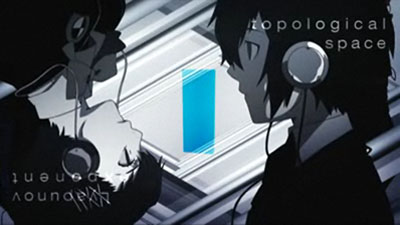
When brain chemicals conspire to make you miserable, comfort comes from few sources. Some spin the lid off a bottle of pills, others appeal to God, and others yet follow booze and sex to a harsher hell. Why not try video games?
Compared to other forms of entertainment escapism, video games engage more senses more often. Music and sound effects, stimulating graphics, words and numbers to process, plots to follow, and — what nothing else offers — tactile engagement. Distraction is a major component in healing ailments such as Obsessive Compulsive Disorder and Depression, and video games take your mind away to other worlds like nothing else. And, aside from immersive FPSs like Bioshock, RPGs often work the best to soothe mind and soul.
“The rhythm of Persona 3 is a carefully measured and flawlessly executed exercise in therapy…”Persona 3 is like a gratuitously large bowl of ice cream. It could almost open a new subgenre: comfort RPGs. Something about the gentle flow of time, from school days to the cicada-filled evenings of summer break back to chilly, leaf-scattered school mornings, makes Persona 3 an exercise in relaxation and contentment. Social links provide quiet, but powerful moments and talking to the members of S.E.E.S. every night before bed provides the same blessings as close friends. Perfectly balanced combat – intense at the right moments – engages the intellect, while persona management stimulates other regions of the brain to provide steady distraction. The exploration of Tartarus is almost monkish in its irresistible repetition. The rhythm of Persona 3 is a carefully measured and flawlessly executed exercise in therapy that goes beyond the already powerful distraction video games provide.
Even if you aren’t plagued by a chronic mental malady, RPGs can heal minor hurts and make harder times seem easier. RPGs like Persona 3 can make you feel among friends when all others have abandoned you, make you laugh after a harrowing breakup, and make you cry for a reason other than your own misery. As a form of healing escapism, video games are second to none, and games like Persona 3 are stolid panaceas with only a rather benign side effect: you may wish to keep playing long after their healing spells are cast.
Fibromyalgia and Chronic Pain
by Kimberley Wallace
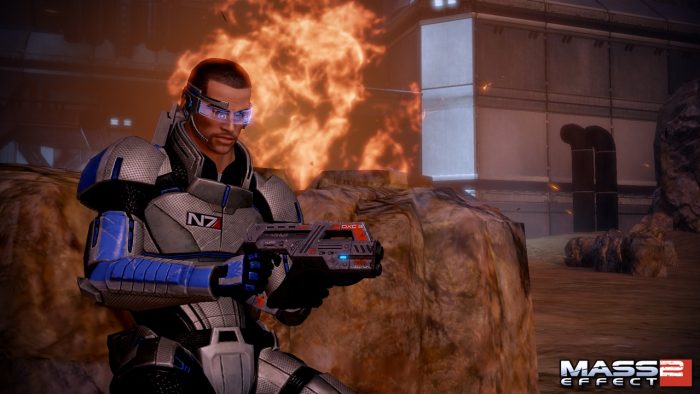
Anyone with an illness that causes chronic pain can tell you one thing: a distraction is always welcome. As someone who suffers from fibromyalgia, a disease that’s primary symptom is prolonged pain spread across tender points in the muscles, tendons, and joints, there are many nights I just can’t get to bed. And that’s only getting to the physical part; your quality of life is affected, and the mental anguish can be just as frustrating as tenderness and pain. It’s really difficult to stay positive when you’re in so much pain – shackled to your bed, unable to really communicate much with the outside world. I’ve said it once and I’ll say it again: sometimes this disease makes me feel like a prisoner in my room.
“I am no longer just a casual observer watching the ride from the outside; I feel immersed, completely a part of an alternate life that leads me to realize my own strengths.”There has been one saving grace that has helped get me through long nights of the pain: video games. Laugh all you want at the thought of a virtual world eclipsing my real-life problems, but it’s important to remember we all need an escape at one point or another. Nobody ever said life was easy to endure, so we must cling to whatever we have that helps us get by. The pull with video games is that they can take me to another a place, another world. The pain is always going to be there, but open-world games allow me a completely new place to explore and get lost in – and maybe give me a short escape. I’ve especially found this even more apparent when these worlds allow me to create my own characters and be a part of the journey. I am no longer just a casual observer watching the ride from the outside; I feel immersed, completely a part of an alternate life that leads me to realize my own strengths.
Many games have had this important effect on me, but I’m going to focus on this year in particular, when I first journeyed into WRPGs. I know I’m tardy to the party, but better late than never. What WRPGs provided me with was a bastion from my prison of pain. Whether it was breaking up fights between Jack and Miranda in Mass Effect 2 or having a laugh at Varric’s witty sense of humor during Dragon Age II, there was something about these games that put me at ease. For a moment, I focus on something other than pain, giving me an oasis from my battle with fibromyalgia. So often, people point a finger at video games for negative aspects; I think it’s time we start focusing on the healing that can come from games. In the dark of the night, I don’t feel so alone with my pain when I have a video game to turn to that has more depth than what appears on the surface. Because when I create that character and enter that fantastical setting, for a while, I don’t have to be the girl who is suffering.



